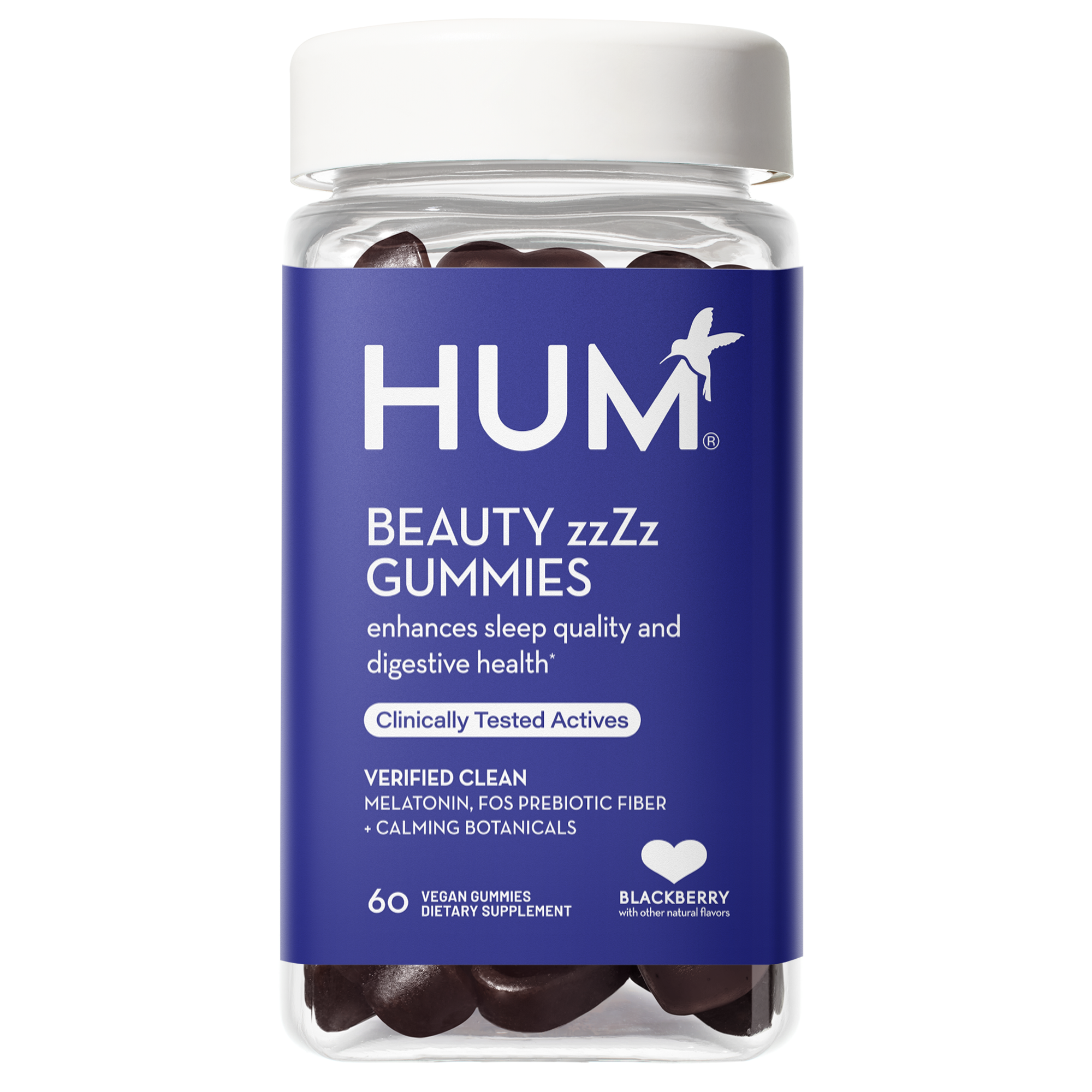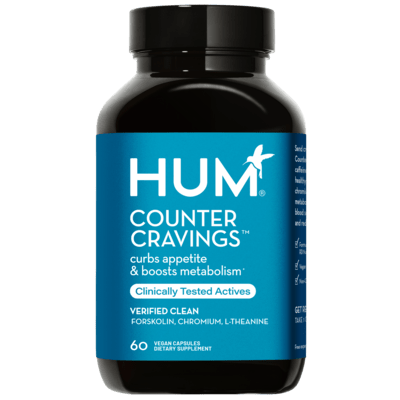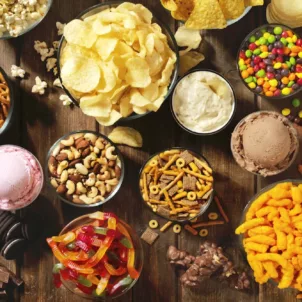Meet ghrelin and leptin, two hunger hormones that play a role in food cravings, weight, and beyond. Discover what each is exactly and how to tell if they’re imbalanced. Plus: tips to support healthy levels of both.
When you hear “hormones,” your brain might immediately jump to your period, or maybe melatonin. BTW, hormones are your body’s powerful chemical messengers, and there are over 50 known hormones pumped out by our endocrine system. They play a vital role in everything from growth and reproduction to mood and sleep.
Hormones also impact metabolism and appetite—and that’s where ghrelin and leptin come in.
“Optimal health is related to these ‘hunger hormones’ and your metabolic reaction to the foods you eat,” says Florence Comite, MD, an endocrinologist and the founder of the Comite Center for Precision Medicine and Health in New York City, Miami Beach, Florida and Palo Alto, California.
Together, leptin and ghrelin regulate our sensations of hunger and satiety by sending signals to our brain, adds Ammara Aziz, MD, an endocrinologist with Northwest Community Healthcare in Arlington Heights, Illinois. When these power players are balanced, our bodies are better able to maintain a consistent weight. Yet if things get too weighed down on one side of the ghrelin vs. leptin seesaw, your appetite and the way your body uses energy can get thrown out of whack.
Ahead, learn more about ghrelin and leptin, including how to tell if your levels might fall outside of the “normal” range. And later: simple strategies you can try today to support balanced hunger hormones.
What Is Ghrelin?
Ghrelin is a hormone produced mainly by the stomach. Small amounts are also released by the small intestine, pancreas and brain, Dr. Aziz explains.
“Ghrelin communicates with the brain to let it know that you’re hungry,” adds Patricia Bannan, MS, RDN, a dietitian based in Los Angeles and the author of From Burnout to Balance. “When your stomach is empty or nearing empty, it releases ghrelin. Once you eat a meal or snack and you feel satiated, ghrelin levels will fall.”
To remember that this is the main “hunger hormone,” Dr. Comite tells her patients and students to think of “grrrhelin,” like a growling stomach. Beyond stimulating appetite, ghrelin also affects carbohydrate metabolism, fat storage, blood sugar, and other processes in the body.

What Is Leptin?
You can think of leptin as the yin to ghrelin’s yang. This hormone regulates appetite and energy balance to maintain your body weight over time (in addition to other important tasks like immune function). But instead of being released by the stomach like ghrelin, leptin is emitted by our white adipose (aka fat) tissue.
“Leptin’s purpose is to tell the body that you’re full, and it plays an important role in weight maintenance. When you have adequate fuel sources and your body is satisfied, leptin levels will increase to communicate to the brain that you don’t need to consume more energy,” Bannan says. “When you’re hungry or unfed, leptin will fall.”
Since the level of leptin in our blood is directly related to how much body fat we have, higher levels of leptin are seen in individuals who live in larger bodies. Research shows that the leptin-to-ghrelin ratio tends to increase with increasing body mass index (BMI).
Over time, elevated levels of leptin can lead to leptin resistance, in which the body loses its sensitivity to the hormone. This can impact the body’s ability to experience feelings of fullness.
If rapid weight loss occurs, a decrease in leptin can trigger the body to enter what Dr. Aziz calls ‘starvation mode,’ which she says makes it difficult to lose more weight. (Psst: This is a very good sign it might be time for a reverse diet.)
“Prolonged fasting associated with intense hunger is likely due to very low leptin levels, especially with weight and fat loss,” Dr. Comite says. “Your body is saying ‘I’m starving; I’d better eat!’” This is why you may experience intense hunger pangs, cravings, or symptoms of binge eating after skipping meals, Dr. Comite continues.
How to Tell If Your Ghrelin and Leptin Levels May Be Imbalanced
“There are many factors that can impact both ghrelin and leptin levels, including genetics, body fat levels, and an energy deficit,” Bannan says.
The only way to directly assess levels of ghrelin and leptin is to get a blood test. However, Dr Aziz says that these tests are rarely performed. Hunger hormone levels are only checked in very specific cases, such as in children who fall under the classification of class III obesity.
If you’re on a calorie-restricted diet, though, cyour ghrelin levels are likely high. This is your body’s savvy way of nudging the brain to feed itself. Also, the more body fat you have, the more leptin you’ll have pumped into your bloodstream to try to cue your brain that you’re all set, so your leptin levels are likely higher.

7 Ways to Promote Healthy Hunger Hormone Levels
As of yet, scientists aren’t aware of any foods, prescriptions, or supplements that could potentially help the body to make leptin optimally to signal fullness. That said, there are several lifestyle habits that can help your leptin and ghrelin levels stay within healthy ranges.
1. Balance Your Macros
Choose meals and snacks that provide protein, carbohydrates (ideally with some fiber), and healthy fats. Doing so can support blood sugar stability, which is an important part of avoiding energy spikes and crashes as well as food cravings. “These balanced meals and snacks will also help your body regulate your natural hunger and fullness cues by supporting ghrelin and leptin balance,” Bannan says.
2. Prioritize Protein
While all three macronutrients are important, protein is the most effective at suppressing ghrelin, Dr. Comite adds. This means it’s also the most satiating macronutrient of the trio. For a 150-pound person, aiming for about 27 to 35 grams of protein per meal is a great goal to ensure you’re consuming enough protein throughout the day.
3. Fuel Regularly
Restrictive fasting is not your BFF if you’re aiming to harness the power of your natural hunger hormone patterns. “Never allow yourself to get famished. Eat at regular intervals throughout the day—about every two to four hours,” Dr. Comite advises. Each of us is unique, so experiment to determine the eating strategy that works best for your own biochemistry.
4. Load Up on Nutrient-Dense Foods
A simple way to feel full on fewer calories (if that’s the goal): Add volume to your plate. Focus on nutrient-dense yet low-calorie foods, such as:
- fruits
- vegetables
- whole grains
- lean meats
- fish
- legumes
From there, accent with healthy fats and more calorie-rich components—such as cheese or butter—in smaller quantities.

5. Stay Active
The World Health Organization, the US Department of Health and Human Services, and the American College of Sports Medicine all recommend that adults aim for 150 minutes of moderate-intensity aerobic activity per week, as well as two total-body strength training sessions.
All exercise improves leptin sensitivity, Dr. Comite says, but it’s especially important not to forget about strength. “Resistance training is key to help maintain muscle mass, which declines with age beginning in the 30s,” she explains. (Tip: Discover how to mix cardio and strength workouts for the best results.)
6. Score More Shut-Eye
Research suggests that sleep deprivation causes ghrelin to rise. Even one night of insufficient sleep can increase ghrelin and hunger levels. “In addition to having many other benefits for our health, getting an adequate amount of sleep helps prevent rises in ghrelin, which makes us feel hungrier,” Dr. Aziz says. Aim for seven to nine hours per night.
7. Practice Self-Care to Reduce Stress
According to Dr. Comite, stress might make leptin resistance more likely. To manage stress and carve out more me time, consider deep breathing, taking a walk, reading a book, or simply turning your phone to Do Not Disturb mode.
The Bottom Line
Ghrelin and leptin are two key hormones involved in our body’s appetite, food intake, and weight gain/loss. “Since we know that leptin levels decrease in response to weight loss, triggering starvation mode, it has helped us understand why weight loss becomes harder as we lose weight,” Dr. Aziz says.
But as we continue to learn more about how to harness the power of these hormones, Dr. Comite suggests looking at your body as a system—not just a set of hormones. She consults patients to look at their full picture of personal health, including their genetics as well as lifestyle habits such as sleep, food, exercise, and restorative practices like meditation. Considering total personal health in tandem with hormonal and metabolic factors, you and your doctor may be able to “predict and reverse aging and diseases that may be emerging at the cellular level and optimize your health span for life and longevity,” Dr. Comite says.
Navigating the world of hormones can be a complex battle. “Remember that you know your body best. So if you feel as though your appetite or weight fluctuations are unusual, ask your health team for guidance,” Bannan advises.













